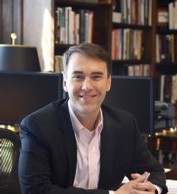STILLPOINT Archive: last updated 04/13/2016
Photo: John Nadeau
As we lead prospective students on tours of the campus, we encourage them to picture themselves here: to imagine being at lunch with new friends in Lane Student Center, for example. In a practice room in Phillips Music Center. In the stacks of Jenks Library, chasing down the answer to an intriguing research question. In the A. J. Gordon Memorial Chapel, listening to a preacher’s challenging words, or in one of several brand-new labs in Ken Olsen Science Center.
As our Admissions tour guides acquaint students and their parents with campus landmarks and with distinctive aspects of a Gordon education, they literally begin with the end in mind. Before they step out of the Frost Hall lobby, the tour guides point out a bust of A. J. Gordon and share what we now call the “Victory Promise.” It is framed around the story of our College founder’s last word as he neared death—“victory”—which serves as a vivid metaphor for a life dedicated to Christian faithfulness and lives well lived.
The College’s Victory Promise articulates four foundational precepts, or pillars. They frame the transformational experiences each Gordon student can pursue. These four categories which are drawn from Gordon’s mission statement convey that we practice what we preach: to graduate men and women distinguished by intellectual maturity and Christian character, committed to lives of service and prepared for leadership worldwide.
It’s appropriate that this issue of STILLPOINT highlights our faculty— in the “Scholars’ Profiles” photoessay, and in other pieces you’ll find throughout the magazine. Our faculty are, after all, the sine qua non of the transformative liberal arts education our mission statement describes, and the chief reason we are so confident about making good on the Victory Promise.
Cultivating intellectual maturity in young adults is profoundly relational. It’s about involving them in the most pressing and interesting questions of our times, and igniting a desire in them to become part of the solution. Professor Mark Gedney, for example, connects the study of philosophy with current discussions on “the role of identity in political, religious and ethnic violence.”
Cultivating the faith and Christian character of young adults happens best in community, where theology is lived. “A crucial part of my approach to learning with young people,” says Associate Professor of New Testament Dan Darko, “is a deliberate effort not only to equip them with information but also that they may be formed and transformed by the Gospel.”
Preparing students for lives of service happens when you talk about why a particular field of inquiry matters. Management specialist Professor Kent Seibert is excited about the emergence, in recent years, of social entrepreneurship and corporate social enterprise. “This is where the institution of business is used not just to generate economic benefit—that is, profit—but also to address social problems and do that in a sustainable way,” he says. “This requires giving attention to the triple bottom line: profit, people and planet.”
Sending young adults into the world as leaders involves blazing trails for them. Professor of Biology Dorothy Boorse’s life’s work—studying climate change, biodiversity loss, chemical pollution and ocean degradation—has taken her all over the country, including to the halls of Congress. Many of her former students have made that path their own.
The “Promise” in Gordon’s Victory Promise is that every student will have at least one experiential learning opportunity in each of the four areas of development that promise describes. None of those opportunities could happen without our expert, caring, committed faculty. You will read about some of them in these pages. I hope their stories will bring to mind your own Gordon experience, and the difference these good people made in your life.
D. Michael Lindsay is the eighth president of Gordon College, and Professor of Sociology. His most recent book is View from the Top: An Inside Look at How People in Power See and Shape the World (Wiley, 2014). President Lindsay is gratified to be working alongside talented colleagues and regards the College’s accomplishments over the past five years as evidence of a winning team on the Gordon campus.
